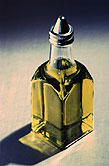Cooking-Oil Combo May Improve Blood Pressure
Mixture of sesame and rice bran oils has heart-healthy effects, preliminary study suggests
 WEDNESDAY, Sept. 19 (HealthDay News) -- Reinforcing the role nutrition plays in heart health, new research suggests that cooking with a combination of sesame oil and rice bran oil can lower mild to moderately high blood pressure.
A small study conducted in New Delhi, India, found that hypertensive adults who added roughly 1.25 ounces of a rice bran/sesame oil mixture to their daily diet experienced a drop in blood pressure nearly equivalent to that experienced by those taking a standard calcium-channel blocker blood pressure medication alone.
And those who consumed both the oil mixture and their blood pressure medication saw a blood pressure drop more than twice that of those taking the drug alone.
The oil combination also seemed to lower so-called "bad" (LDL) cholesterol and raise "good" (HDL) cholesterol, the researchers reported. This cholesterol profile improvement was not found among those taking a medication alone.
"We had previously reported that sesame oil by itself has a strong impact on blood pressure," said study lead author Dr. Devarajan Sankar, a research scientist in the department of cardiovascular disease at Fukuoka University Chikushi Hospital in Chikushino, Japan. They found that sesame oil has a calcium-channel-blocking effect similar to that of calcium-channel-blocker drugs, he said.
"But now, we found that when sesame oil is combined with rice bran oil, the two together have a remarkable synergistic effect on high blood pressure," he said.
The researchers believe this effect is mainly due to antioxidants -- sesamin, sesamol and sesamolin in sesame oil, and oryzanol in rice bran oil. Both oils also contain unsaturated fatty acids -- "what we used to call 'good fats,'" Sankar said.
It's too soon, however, to recommend that anyone forgo their prescribed medication in favor of this cooking-oil combination. The study is preliminary and far more research is needed to prove the findings are valid and ready to benefit patients, experts cautioned.
Sankar and his colleagues are scheduled to report their findings Wednesday in Washington, D.C., at a meeting of the American Heart Association.
The two-month study included 160 men and 140 women with an average age 57 who had high blood pressure. They were divided into three groups: one taking the calcium-channel-blocker medication nifedipine; a second group adding a specially designed (and not commercially available) oil blend to their cooking and salads that included 80 percent physically refined high oryzanol rice bran oil and 20 percent unrefined sesame oil; and a third group that consumed both nifedipine and the oil mix.
After checking blood pressure levels every 15 days, the team found that all patients experienced sizable drops in systolic blood pressure (the top number of a blood pressure reading) and diastolic blood pressure (the bottom number).
But those taking both the oil mix and medication fared best. Systolic readings fell 14 and 16 points among those taking the drug alone and oil alone, respectively, but they plunged 36 points among those taking both.
Similarly, diastolic readings fell 11 and 12 points among those taking the drug alone and oil alone, respectively, while the combination group saw a 24-point drop.
Those taking the oil mixture alone or alongside the channel-blocker medication saw a 26 percent to 27 percent drop in bad cholesterol and a 9.5 percent to 10.9 percent rise in good cholesterol.
Sankar said his team plans to explore how the same oil mixture stacks up against other blood pressure medications, such as beta-blockers and ACE inhibitors.
Registered dietitian Lona Sandon, assistant professor of clinical nutrition at the University of Texas Southwestern Medical Center in Dallas, said the study "shows the potential power of food and food components."
Findings like these are important, Sandon noted, especially in light of reports from the U.S. Centers for Disease Control and Prevention regarding people whose high blood pressure isn't controlled by medication. High blood pressure is a leading cause of stroke.
Still, "while this is very interesting and promising research, [it] has to be looked at further," she said.
Dr. Gregg Fonarow, a spokesman for the American Heart Association and professor of cardiology at the University of California, Los Angeles, agreed.
"While it has been well-documented that diet can impact blood pressure, the lowering seen here is way out of proportion to what one might expect," he said. "One problem could be the study design, in which all the patients knew exactly what they were being given, which gives a little pause as to what these findings may mean."
"I would be cautious with any interpretation of these results, and I would certainly like to see them replicated independently," he added.
Data and conclusions presented at meetings should be considered preliminary until published in a peer-reviewed medical journal.
More information
For more on high blood pressure, visit the American Heart Association  . .

|